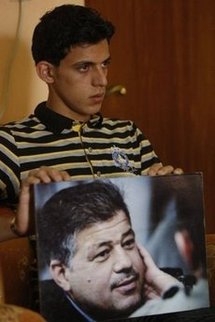
Samer, son of killed Reuters news agency chauffeur Saeed Chmagh, shows a picture of his father during an interview at his home in Baghdad. (AFP/Ahmad al-Rubaye)
"The truth came out and the whole world saw. The American pilot should be judged by international justice and we want compensation because the act left orphans," said Safa Chmagh, whose brother Saeed Chmagh, a Reuters driver, died.
"He (the pilot) killed unarmed innocent people, among them a photographer whose camera was very visible. On top of that when they evacuated the wounded they opened fire again," said Safa, whose brother was 44 when killed.
Nameer Nooraddin Hussein, a 22-year-old photographer with Reuters, was also shot to death. The families said they have until now received no compensation for the incident which took place on July 12, 2007.
The video included audio conversations between Apache helicopter pilots and controllers where the US military identified the men in a Baghdad street in broad daylight as armed insurgents and asked for permission to open fire.
The footage showed the Reuters men and other Iraqis gunned down in the Ameen district of Baghdad in a hail of cannon fire from an Apache's gunner.
Saeed Chmagh's grieving son Salwan, 20, was deeply disturbed by the footage which was aired on Arab television channels and seen by more than four million people on the Internet.
"I want the American pilot who killed my father to be judged," he exclaimed, while close to tears in the Chmagh family's Baghdad home.
"Why did he do that? Were the victims not innocent? Were they not human beings? We want our father," he said.
Samer Chmagh, the murdered Reuters driver's second son, said he did not understand why the US helicopter had opened fire.
"They were not members of a militia. Everybody saw from the pictures that they were journalists," he said.
The father of Reuters photographer Hussein, speaking to AFP from the northern city of Mosul, also demanded justice and called for a tribunal in The Hague.
"The innocents were killed in cold blood," said Nooraddin Hussein, 63.
"I was very sad when I saw the images but today at least the American people will know the troops of their army were pleased to kill people."
The White House on Tuesday described the leaked footage as "tragic" but President Barack Obama's spokesman Robert Gibbs said US forces in war zones take pains to avoid civilian casualties.
The Pentagon has not disputed that the video is authentic.
-------------------------------------------------------------------------------
"He (the pilot) killed unarmed innocent people, among them a photographer whose camera was very visible. On top of that when they evacuated the wounded they opened fire again," said Safa, whose brother was 44 when killed.
Nameer Nooraddin Hussein, a 22-year-old photographer with Reuters, was also shot to death. The families said they have until now received no compensation for the incident which took place on July 12, 2007.
The video included audio conversations between Apache helicopter pilots and controllers where the US military identified the men in a Baghdad street in broad daylight as armed insurgents and asked for permission to open fire.
The footage showed the Reuters men and other Iraqis gunned down in the Ameen district of Baghdad in a hail of cannon fire from an Apache's gunner.
Saeed Chmagh's grieving son Salwan, 20, was deeply disturbed by the footage which was aired on Arab television channels and seen by more than four million people on the Internet.
"I want the American pilot who killed my father to be judged," he exclaimed, while close to tears in the Chmagh family's Baghdad home.
"Why did he do that? Were the victims not innocent? Were they not human beings? We want our father," he said.
Samer Chmagh, the murdered Reuters driver's second son, said he did not understand why the US helicopter had opened fire.
"They were not members of a militia. Everybody saw from the pictures that they were journalists," he said.
The father of Reuters photographer Hussein, speaking to AFP from the northern city of Mosul, also demanded justice and called for a tribunal in The Hague.
"The innocents were killed in cold blood," said Nooraddin Hussein, 63.
"I was very sad when I saw the images but today at least the American people will know the troops of their army were pleased to kill people."
The White House on Tuesday described the leaked footage as "tragic" but President Barack Obama's spokesman Robert Gibbs said US forces in war zones take pains to avoid civilian casualties.
The Pentagon has not disputed that the video is authentic.
-------------------------------------------------------------------------------









 Home
Home Politics
Politics









